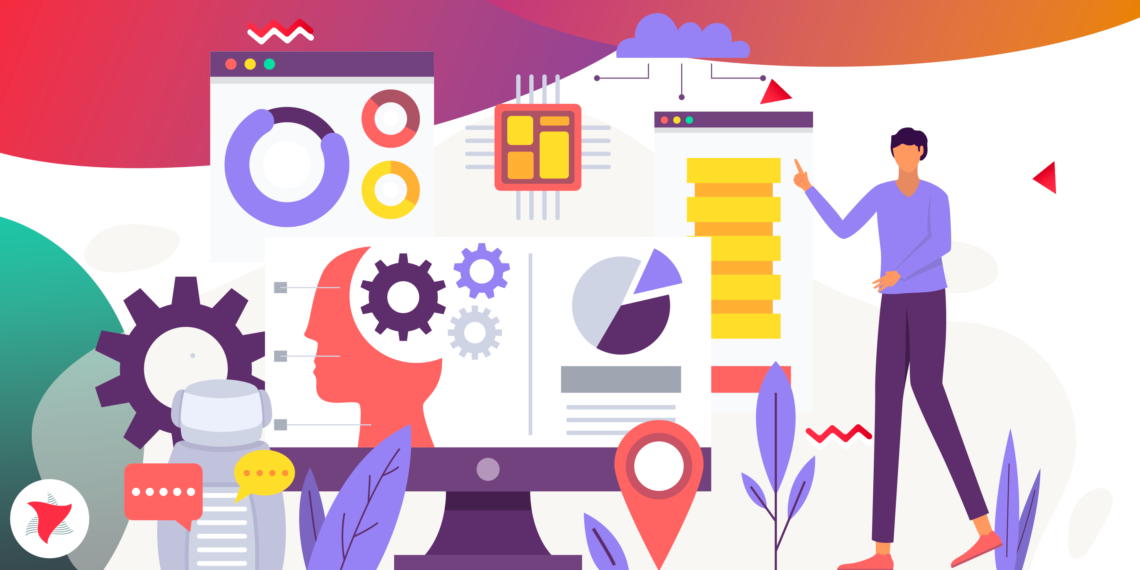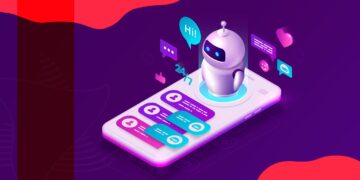Using artificial intelligence (AI) is not something new for many of us. When applied to marketing, AI uses techniques such as machine learning to improve customer experiences by making customised offers in real-time, for example. But the organisational benefits of marketing AI also regard automating large-scale and repetitive tasks and letting leaders work on planning and creative strategy.
According to Salesforce, AI is a term that describes any technology that can learn and take actions based on automated decisions and past learnings. So, the more data the AI gathers, the faster it can adapt to the needs of your audience. Firstly, to better start understanding AI in marketing, begin your journey with us by analysing the roles of this technology in marketing:
- Marketing automation: AI can do tasks such as lead generation, scoring, and customer retention while it helps marketers identify possible customers and engage with them.
- Personalisation: AI technology can create a customer’s profile based on retrieved data. It can then promote targeted advertising, offers or new products that match the customer’s tastes.
- Forecasting: finally, AI is used as a predictive tool for analytics and forecasting. It uses past interactions to predict future actions of the customer.
Below, find the table of contents for this article:
- How is AI growing in marketing?
- What are the benefits of AI for marketing?
- How can I implement AI for marketing with Salesforce?
1. How is AI growing in marketing?
You already know that the AI market is growing daily. But we summarised some statistics that might enlighten your mind and make you understand why you need to implement AI in your company.
- 86% of CEOs say that AI will be mainstream technology in their office in 2021
- 91.5% of leading businesses are investing in AI on an ongoing basis
- 89% of C-level executives found chatbots very useful for personalising customer interactions
- 69% of C-level executives reported reduced costs on operations due to chatbots
- 48% of marketing leaders say AI is making a big difference in how customers interact with brands
- 51% of eCommerce companies use AI for a seamless experience
- 67% of B2B marketers say AI is crucial for their marketing strategy
- 64% of marketers already are using AI in their marketing toolkit
As Salesforce mentions in the State of Marketing 2022, there are some priorities and challenges of marketers that AI can answer fastly. These are marketers’ top priorities:
- Innovating
- Engaging with customers in real-time
- Creating a cohesive customer journey across channels and devices
- Improving marketing ROI/attribution
- Improving collaboration
On the other hand, find the marketers’ top challenges below:
- Engaging with customers in real-time
- Innovating
- Creating a cohesive customer journey across channels and devices
- Collaboration
- Insufficient organisational structures and processes
As marketers enter a new era of customer engagement, they focus on innovating and understanding what’s working and what’s not. It’s clear how AI can answer the main concerns of the marketing industry now.
Plus, marketers are embracing this technology when the spotlight is on artificial intelligence. 60% of marketers are open to using AI to improve experiences.
As the State of Marketing 2022 mentions, here are the top 5 AI use cases among marketers:
- Drive next best actions
- Personalise the overall customer journey
- Automate customer interactions
- Personalise individual channel experiences
- Process automation
As you read from the stats above, marketers can meet their needs by using AI in the leading three roles this technology has in marketing.
2. What are the benefits of AI for marketing?
The benefits of using AI in your marketing strategy are almost clear by learning the advantages of this kind of technology.
AI-powered marketing tools will increase the speed of your processes. It crunches vast loads of information from different platforms. It also bridges the gap between data and actionable solutions that will ignite your marketing and sales campaigns. Below, find the four main benefits of using AI for your marketing strategy:
- Automated decisions: AI marketing technology can automate data-based decisions instantly. Data is everything in marketing. It can show how your customers react to your messages and which strategies you should use for your email campaigns, for instance.
- Saves time and money: besides AI-marketing tools requiring an initial investment, its payback is fast while it gives you cost savings. Consequently, businesses can work fast and efficiently without having a specific staff for that manual. Instead of an entire team, you can focus on recruiting employees that perform critical tasks. Also, a big plus is that AI tech also lessens human error.
- Personalisation in real-time: customers want you to know what they want, when they want and where they need it. AI marketing tools help you adapt your sales and marketing strategies for a personalised experience for any specific customer. AI, for instance, can use predictive analytics to understand customers’ behaviours better and buying processes and habits.
- Increases ROI: AI technology provides deep customer insights, showing you what your buyers want. Also, it helps you with lead nurturing and guides the lead forward in the sales funnel, ultimately leading to sales and increased ROI.
3. How can I implement AI with Salesforce?
If you’re a Salesforce user already, these insights might not be new to you. However, if you want to understand how Salesforce solutions can help your AI for marketing initiatives, stick with us a little more.
Based on Einstein AI, Salesforce brings you many features for all clouds. It’s the product Salesforce developed for AI technology. And when we’re speaking about Sales Cloud, some essential elements such as lead and opportunity scoring or forecasting are based on AI insights that use automated machine learning.
Speaking about Salesforce Marketing Cloud, there are some AI-powered features you might enjoy trying as sooner as possible:
- Einstein Engagement Scoring: this will help you with your e-mail marketing campaigns. Basically, you can get to know your audience better by scoring their actions, monitoring and then segmenting. AI will create audiences and target specific segments, while it can personalise content based on the provided score.
- Einstein Recommendations: every interaction counts for Einstein! It analyses every click, download, view, or purchase to shape a full picture of your customer profile and recommends actions based on that analysis.
- Einstein Messaging Insights: it’s a real-time stream of notifications, identifying anomalies in your messaging’s engagement and giving suggestions to optimise your content.
- Einstein Send Time Optimisation: it uses machine learning to identify the best time for you to send a message to a subscriber so it gets the highest chance of being opened.
- Einstein Engagement Frequency: similar to the above feature, it optimises how often you should contact your subscribers instead of the optimal time. It’s helpful to assess if your subscribers are over or undersaturated with emails.
- Einstein Copy Insights: this feature is focused on analysing the language used in the subject lines of your emails, providing you with insights about engagement patterns on CTAs, punctuation, originality, and detected emotional tone.
- Einstein Content Selection: it helps you in Content Builder – you can build content personalised for each customer since Einstein automatically selects the best marketing assets for each subscriber based on behaviour.
Now that you know more about what AI can do for your marketing tasks subscribe to our blog for more content. Stay tuned for more updates!
SUBSCRIBE KNOWLEDGE CENTER
Subscribe for free to our Knowledge Center to get the latest articles straight to your inbox!







